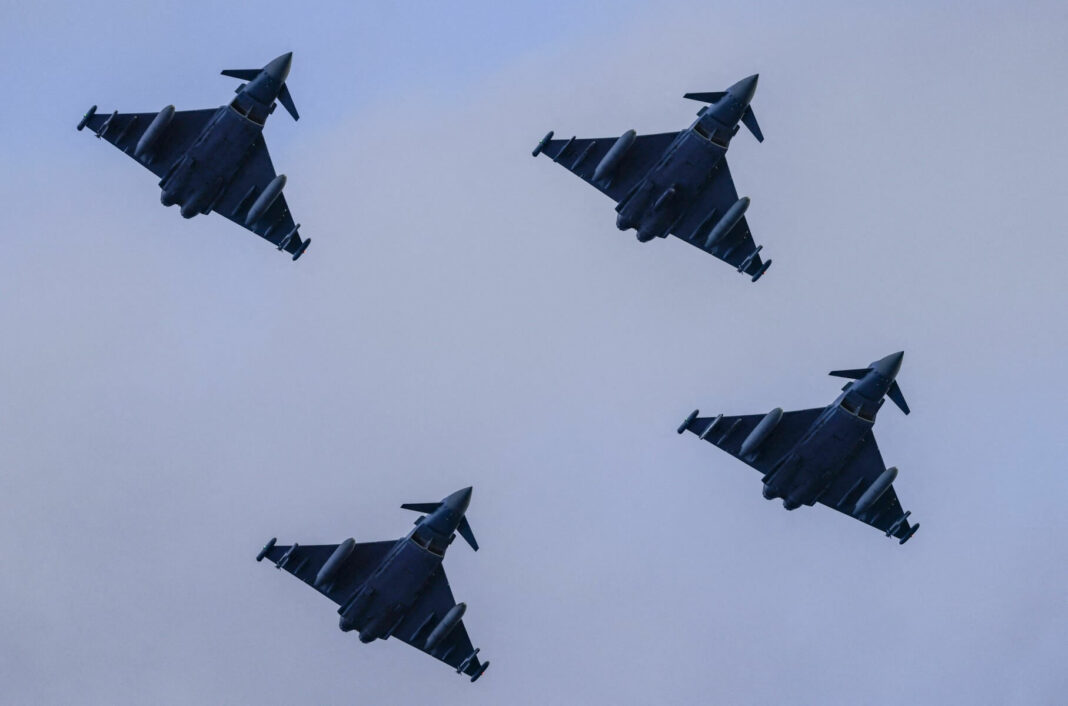Turkey has accelerated technical work on the procurement of Eurofighter Typhoon fighter jets, Reuters reported, citing a Turkish defense ministry official on Thursday who denied the existence of any preconditions from Germany for the sale.
“Technical level work for the procurement of Eurofighter Typhoon jets is under way. The work is aimed at accelerating the process. No conditions have been raised,” the defense ministry official told reporters in Ankara.
A report on the Middle East Eye (MME) news website, however, claimed on Wednesday that Germany, which recently agreed for the first time in years to the large-scale export of arms worth several hundred million euros to Turkey, according to German media reports last week, was seeking guarantees on how Turkey will use Eurofighters and tank parts once they are exported.
After initially objecting to it, Germany officially began technical talks with Ankara earlier this week for the potential sale of up to 40 Eurofighter Typhoon warplanes, valued at $5.6 billion. It was the only country among a consortium of countries producing the jets consisting of Spain, Italy and the UK that was against the sale.
The MEE report, based on sources, said officials in Berlin told their Turkish counterparts earlier this month that they would still approve naval weapons sales but beyond that, any tangible expectation in other areas, such as aircraft weaponry, wouldn’t be realistic.
“The Germans quite clearly said that beyond the naval needs, Berlin’s hands were tied due to internal opposition to any arms sales to Turkey,” the source added.
Another source said Germany’s move was only aimed at saving face given the fact that other members of the consortium support the sale of the jets to Turkey.
The second source also added that Germany would only make progress on the Eurofighter request if Turkey provided written guarantees that the aircraft would not be used to violate disputed Greek airspace in the Aegean, a condition Ankara finds unacceptable.
Defense industry analysts consulted by Turkish Minute also said although Turkish Defense Ministry officials claim no preconditions have been raised regarding the sale of Eurofighter jets, Germany will not approve the sale without obtaining a guarantee from Turkey that the aircraft will not be used to escalate tensions with Greece in the Aegean and eastern Mediterranean.
In recent years Berlin had drastically reduced all arms exports to Turkey amid tensions in the relationship caused by Turkish President Recep Tayyip Erdoğan’s policies against critics in the country and military operations targeting Kurdish groups in Syria and Iraq.
The decision for the start of arms exports to Turkey was made by the Federal Security Council, chaired by Chancellor Olaf Scholz, according to a report on the Der Spiegel news website last week.
The arms to be exported to Turkey include 100 anti-aircraft missiles and torpedoes for the Turkish naval forces and parts for the modernization of Turkish submarines and frigates.
Last month Erdoğan met with German Chancellor Scholz on the sidelines of a United Nations meeting in New York. Scholz is also set to meet with Erdoğan on Saturday in İstanbul, where they are expected to discuss the sale of Eurofighter jets.
Germany’s decision to restart large-scale arms exports to Turkey comes on the heels of recent reports in the German media, also confirmed by Interior Minister Nancy Faeser, about a deal between the governments of Turkey and Germany for the deportation of Turks whose asylum applications in Germany had been rejected.
German sources’ leaking of their views on the Eurofighter sale to MEE before the meeting could be a tactic by the German side to gain the upper hand in the deal regarding the deportation of Turkish asylum seekers, according to the defense industry analysts.
NATO member Turkey, which is keen to upgrade its air force, earlier this year secured a deal to procure 40 F-16 fighter jets and 79 modernization kits for its existing F-16s from the United States, after a long-delayed process. Ankara is also developing its own national combat aircraft, the KAAN.



